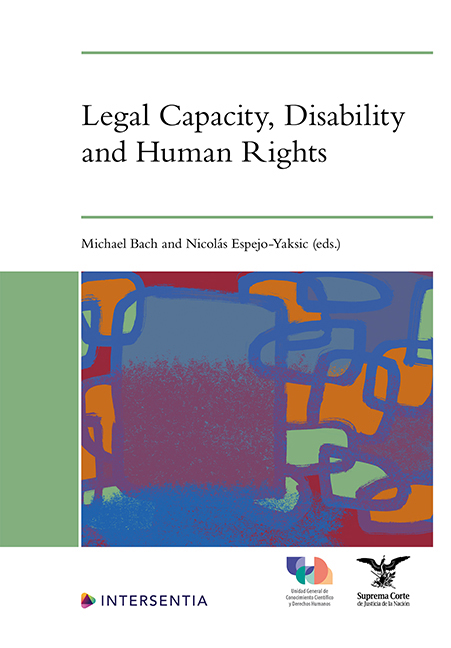Book contents
- Frontmatter
- Foreword
- Acknowledgements
- Contents
- List of Cases
- List of Contributors
- Legal Capacity, Disability and Human Rights: Introduction
- PART I HISTORICAL PERSPECTIVES AND THEORETICAL FRAMES
- PART II LAW REFORM: COUNTRY AND REGIONAL PERSPECTIVES
- PART III LEGAL QUESTIONS, PERSISTENT CHALLENGES
- Index
- About the Editors
Contractual Capacity of Persons with a Disability in the Spanish Civil Code
Published online by Cambridge University Press: 03 April 2024
- Frontmatter
- Foreword
- Acknowledgements
- Contents
- List of Cases
- List of Contributors
- Legal Capacity, Disability and Human Rights: Introduction
- PART I HISTORICAL PERSPECTIVES AND THEORETICAL FRAMES
- PART II LAW REFORM: COUNTRY AND REGIONAL PERSPECTIVES
- PART III LEGAL QUESTIONS, PERSISTENT CHALLENGES
- Index
- About the Editors
Summary
CONTRACTUAL CAPACITY IN THE SPANISH CIVIL CODE
In its original version, the Spanish Civil Code (CC) of 1889 considered “insane” or “demented” persons who were unable to govern themselves and manage their property as persons susceptible to be legally incapacitated. Incapacitation was contemplated as an instrument to protect the personal and property interests of the incapacitated person declaring their contractual irresponsibility (Article 1301, which supposed that the guardian was empowered to act in place of their ward).
Leaving aside the contractual capacity of minors, I will indicate that the second item of Article 1263 CC, in its original version, stated that the following could not grant consent “2” . The insane and demented persons and the deaf and dumb who cannot write “ . It was understood that when a person lacked the capacity to understand and express a will, the action or business they entered into could not be valid and effective. From the possible solutions – nullity of all actions, validity of the actions, unless “insanity” or voidability were shown – the law historically opted for the latter considering it to be the most favourable to the interests of the incapacitated, and also applied, for their benefit, the various protective provisions outlined for guardians of minors.
In the original version of Article 1263.2, the Code did not make a distinction between those who were judicially incapacitated or not. From this precept, F. de Castro held that it is incapacitation that vitiates the contract entered into by the incapacitated and that, if being done for the benefit of the protected person, capable persons who contracted with the incapacitated person could not allege incapacity (Article 1302 CC). Castro adds that an easy and rapid defence was thus provided for the incapacitated person, which does not preclude the possibility of requesting a declaration of nullity for lack of consent (Article 1261 CC). In this case it is necessary to prove that the person acted with out the necessary reason at the time of contracting.
- Type
- Chapter
- Information
- Legal Capacity, Disability and Human Rights , pp. 319 - 332Publisher: IntersentiaPrint publication year: 2023

